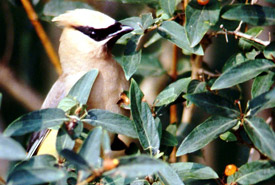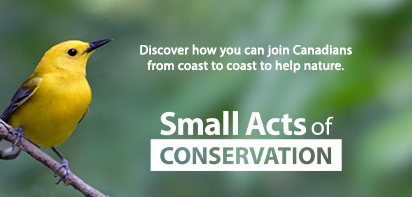Upper Whitesand 2

Cedar waxwing (Photo by Glen Maceachern)
About Upper Whitesand 2
- Located in the Aspen Parkland Ecoregion, specifically on the Whitesand Plain, with grasslands, hardwood forest, shrublands and seasonal and permanent wetlands.
- About 14 km southwest of Invermay or 70 km northwest of Yorkton in RM of Invermay #305. Dog Lake, a large wetland, is directly north.
- 129 hectares (319 acres) of uplands and wetlands in the East Parkland Natural Area with walking trail (1.6 km) diagonal from southeast corner.
- Threats to long-term conservation: Habitat loss and fragmentation from cultivation, intensive grazing, residential and commercial development, invasive plant species.
- Provides habitat for mammals, forest (including neotropical) and grassland birds, and breeding waterfowl.
Species that may be viewed here:
- northern leopard frog
- piping plover
- Baird's sparrow
- red-headed woodpecker
- Sprague's pipit
- American white pelican
- bobolink
- bald eagle
- cedar waxwing
- Franklin's gull
- great horned owl
- Richardson's ground squirrel
- cougar
- American black bear
- raccoon
- red fox
- fescue prairie grasses
- quacking aspen
- prickly rose
- northern snowberry
- wolfwillow
- serviceberry
- choke cherry
- See NCC's species list for the Aspen Parkland Ecoregion.
This list contains all species viewed and recorded by NCC in Saskatchewan's Aspen Parkland Ecoregion. How many of these species have you seen here? (Use the species list to keep track!)
Please note:
- NCC permits foot access only.
- Leave gates closed, fences intact.
- Enter this property at your own risk. Beware of livestock.
- Keep memories and only take photos. Do not litter or dispose of garbage here.
Contact NCC or call 1-866-622-7275 to:
- Lease this area for livestock grazing.
- Hunt on this property.
- Learn more about NCC's work in Saskatchewan.
- Contribute to NCC's conservation work in Saskatchewan.
- Donate to NCC's conservation work in Saskatchewan.
The Nature Conservancy of Canada is a not-for-profit, private land conservation organization, protecting ecologically significant natural lands and the species they sustain. NCC works with individuals, corporations, foundations, governments and communities to protect this living heritage for future generations to enjoy.




